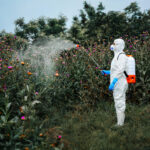Weedkiller’s cancer link: New review adds to the case
 (NaturalHealth365) It’s unfortunate that the term “weedkiller” has become so closely associated with cancer – just look no further than the ongoing litigations between cancer patients and Big Agricultural powerhouse Monsanto, the notorious creator of Roundup.
(NaturalHealth365) It’s unfortunate that the term “weedkiller” has become so closely associated with cancer – just look no further than the ongoing litigations between cancer patients and Big Agricultural powerhouse Monsanto, the notorious creator of Roundup.
But as industry-backed “experts” continue to claim that the link between the world’s most popular herbicide and cancer is “controversial,” we continue to see more evidence showing just how plausible and indeed probable it is that this toxin is causing serious harm to humans.
Glyphosate-based herbicides, “the most heavily used herbicides in the world,” are probable human carcinogens, latest research update confirms
A 2021 research review published in Clinical Lymphoma, Myeloma & Leukemia describes glyphosate-based herbicidal formations like Roundup as “the most heavily used herbicides in the world.” Indeed, according to the U.S. Environmental Protection Agency (EPA), around 280 million pounds of glyphosate are applied to nearly 300 million acres of cropland in the United States alone every year – the vast majority of it going to crops of soybeans, corn, or cotton (and we can only imagine how much of that annual dose is getting into our water and soil).
The authors of the above-noted 2021 review also noted that “the International Agency for Research on Cancer (IARC) concluded that glyphosate and [glyphosate-based herbicides] are probably carcinogenic to humans (group 2A), mainly for non-Hodgkin lymphoma [NHL].” They add that “epidemiologic studies provide ample evidence for an association between exposure to [glyphosate] and an increased risk of NHL,” and indeed cite various animal and laboratory studies suggesting harm “even at low doses” of exposure.
“This evaluation,” the authors note, “provides coherent and compelling evidence that glyphosate … are a cause of NHL in humans exposed to these agents. These findings should prompt new reviews by pesticide regulatory agencies around the world.”
Now, less than two years later, yet another systematic review – this one published in the latest issue of the peer-reviewed journal Chemosphere – serves to “strengthen the mechanistic evidence that glyphosate is a probable human carcinogen and provide biological plausibility for previously reported cancer associations in humans, such as non-Hodgkin lymphoma.”
To be clear, we appreciate the ongoing investigation and the increasing call to hold Big Ag stakeholders accountable. But at this point, it’s almost fair to ask: Why do we even need more evidence to show just how cancerous these herbicides can be? Isn’t it painfully obvious at this point?
Glyphosate features at least 5 of 10 key characteristics of chemicals that cause cancer, according to scientists
This newer paper, entitled “Mapping the key characteristics of carcinogens for glyphosate and its formulations: A systematic review,” actually compiled an “exhaustive” amount of data in order to compare glyphosate to 10 key characteristics of chemicals that are already known to cause cancer. In other words, the authors wanted to know just how similar to known carcinogens are glyphosate-based herbicides.
As it turns out: very similar. By extracting more than 50,000 data points from 175 articles that met their inclusion criteria, the reviewers were able to determine that there is “strong evidence” showing that glyphosate has at least 5 out of 10 characteristics commonly seen in known carcinogenic compounds. Specifically, the data they analyzed showed that glyphosate is carcinogenic because it can cause:
- Genotoxicity – a process that causes damage to DNA and/or chromosomes and may lead to cancer
- Epigenetic alterations, in which genes are turned “on” or “off” in the body
- Oxidative stress, in which damaging free radicals accumulate in the body
- Chronic inflammation
- Endocrine disruption
The authors add that the herbicide has also shown to produce a “perturbation of the gut microbiota,” which they argue could also help explain the link between glyphosate and lymphomagenesis, otherwise known as the growth and development of lymphoma.
Ensuring people have access to food is important. But at what cost to our environment and our health as a global community? Will Big Agra truly be held accountable for its dependency on cancer-causing compounds, and will safer alternatives be championed? What do you think, readers? (Post your thoughts in the comment section below)
Sources for this article include:
Sciencedirect.com
Childrenshealthdefense.org
NIH.gov
NIH.gov
Medlineplus.gov
EPA.gov



